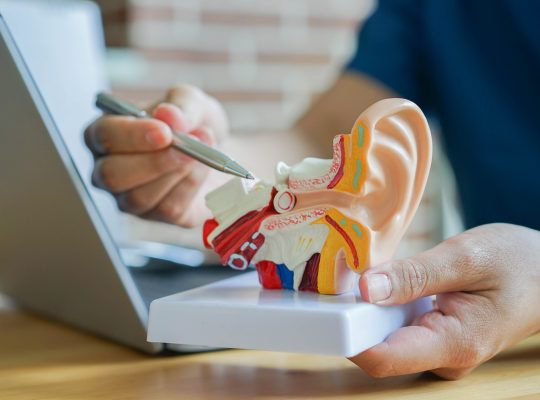When you think of hearing damage, causes such as loud music, noisy workplaces or festivals often come to mind. But did you know that certain medications can also negatively affect your hearing? This is also known as ototoxicity. It literally means toxic to the ear. And while medications are obviously meant to make you better, some side effects can be annoying or even permanent – including hearing loss, tinnitus or balance problems. In this blog, we’ll take you through the world of medications that can affect your hearing, what you need to know about them and how to protect yourself.
What exactly is ototoxicity?
Ototoxicity refers to damage to the inner ear caused by certain substances, usually drugs or chemicals. The inner ear consists of the cochlea, which is responsible for hearing, and the balance organ (vestibular system). When these structures become damaged, symptoms such as:
- Hearing loss(sudden or gradual)
- Tinnitus
- Sensitivity to sound(hyperacusis)
- Problems with balance or dizziness
The severity of these symptoms depends on the type of drug, the dosage, how long you have been taking it and how sensitive you yourself are.
What medications can affect your hearing?
There are several groups of drugs known for their ototoxic effects. Not everyone who takes these drugs will have problems, but it’s good to know what to look out for.
1. Antibiotics (aminoglycosides).
A specific group of antibiotics, the aminoglycosides, can affect hearing. Examples include gentamicin, tobramycin and amikacin. They are often used in serious infections, such as in hospitals. The risk of hearing damage is greater with high doses or long-term use.
2. Urinary agents (diuretics).
Some urinary drugs, such as furosemide and bumetanide, can cause temporary hearing problems. These drugs are often prescribed for heart failure or high blood pressure. Usually the symptoms disappear once the drug is tapered off or replaced.
3. Cancer drugs (chemotherapy).
Certain chemotherapies, such as cisplatin and carboplatin, are notorious for their harmful effects on hearing. In some patients, this can lead to permanent hearing loss. Therefore, hearing is often closely monitored during treatments.
4. Painkillers and antipyretics
At high doses, drugs such as aspirin (acetylsalicylic acid) and some NSAIDs (e.g., ibuprofen, naproxen) can cause tinnitus or hearing loss. Fortunately, these side effects are usually temporary and disappear once you stop taking the drug.
5. Malaria drugs
Drugs used against malaria, such as quinine, can sometimes cause hearing loss or tinnitus. This is less common today because quinine is less commonly used as a drug.
6. Other examples
Certain antidepressants, antibiotics other than aminoglycosides, and erectile dysfunction drugs have also been associated with hearing problems. These are often rare cases, but it is important to be alert.
How do you notice when a medication affects your hearing?
The signals may begin subtly. Consider:
- A persistent ringing or ringing in your ears after starting a medication.
- Having difficulty hearing soft sounds or high-pitched sounds.
- Sensation of fullness or pressure in the ear.
- Dizziness or balance problems you didn’t have before.
If you notice these kinds of symptoms, discuss them with your doctor or pharmacist as soon as possible. Don’t wait too long – early detection can prevent worse.
Can you prevent hearing damage?
Eliminating it completely is difficult, but there are ways to reduce the risks:
- Always ask about side effects – especially if you are prescribed a new drug.
- Use medications as prescribed – never increase the dosage yourself.
- Report hearing problems immediately – doctors can often switch to an alternative medication or adjust the dose.
- Get your hearing tested – especially if you are taking a medication known to affect your hearing.
- Protect your ears from additional risks – avoid loud noises if you know your medication may be ototoxic.
Temporary or permanent?
The tricky thing about ototoxic side effects is that they are sometimes temporary but can also become permanent. With drugs like aspirin or furosemide, symptoms often disappear after stopping. With drugs like cisplatin or gentamicin, the damage can be permanent.
This is why monitoring is so important. In hospitals, patients receiving ototoxic chemotherapy are often regularly tested for their hearing so that timely intervention can be made.
What can you do yourself if you have suffered hearing damage?
Sometimes, unfortunately, it is impossible to prevent a medication from permanently affecting your hearing. In that case, fortunately, there are aids and solutions to make your life as comfortable as possible:
- Hearing aids: amplify sounds and help with hearing loss.
- Tinnitus masking devices: devices or apps that provide background noise to soften a beep.
- Hearing protection: If your ears are already fragile, protection during loud noises is extra important.
- Support and guidance: audiologists and ENT doctors can advise on the best course of action.
Conclusion
Medications are meant to help us, but sometimes they have side effects we don’t immediately expect – such as hearing loss or tinnitus. This phenomenon, ototoxicity, is more common than you think. The risk is especially present with certain antibiotics, chemotherapy, urinary agents and painkillers.
The most important thing is alertness: recognize the signs, report complaints early and protect your ears as best you can. Because your hearing is precious, and once lost, unfortunately, it does not come back.
So: if you need to take medication, don’t be worried, but be aware. And always ask your doctor or pharmacist your questions – your ears will thank you for it.








